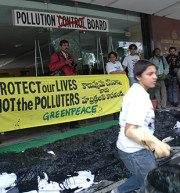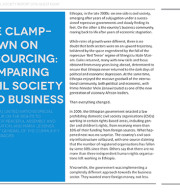
NAIROBI/GENEVA - United Nations Special Rapporteur Maina Kiai has published a legal analysis arguing that India's Foreign Contributions Regulation Act (FCRA) - which regulates foreign funding to certain individuals, associations and companies - is not conformity with international law, principles and standards. The analysis, which was submitted to the Government of India on April 20, 2016, is available here. The FCRA, which was enacted in 2010, bars “organizations of a political nature” from accepting foreign contributions. Acceptance of foreign contributions may further be prohibited where the Government “is satisfied that the acceptance of foreign contribution… is likely to affect prejudicially… public interest.” The law has come under scrutiny in recent years, with some sources reporting that nearly 14,000 NGOs have seen their licenses to receive foreign funding revoked by the Government. The Special Rapporteur argues that the ability of civil society organizations to access resources, including foreign funding, is a fundamental part of the right to freedom of association under international law, standards, and principles – and more particularly part of the right to form an association. He further asserts that India’s limitations on access to foreign funding do not meet... Continue reading →

VIENNA - Special Rapporteur Maina Kiai has called upon the Financial Action Task Force (FATF) - an intergovernmental body that sets standards to combat money laundering and terrorist financing - to improve its cooperation with civil society, and to consider the sector's significant contributions in the fight against terrorism. He also commended the body for its decision to review its interpretation of Recommendation 8, a controversial measure that requires FATF member States to ensure that their laws sufficiently prevent non-profit organisations from financing of terrorism. The Recommendation has drawn sharp criticism in recent years, with many civil society organizations - and Kiai himself - reporting that oppressive governments have used it as an excuse to crack down on dissent. Kiai, who is the Special Rapporteur on the rights to freedom of peaceful assembly and of association, made the comments via a written submission to FATF's "Consultation and Dialogue Meeting with Non-Profit Organizations," held on April 18 in Vienna, Austria. The delegates will examine the impact of Recommendation 8 on civil society, among other things. The Special Rapporteur further called upon FATF "to leverage its leadership position to positively influence governments’ approach to counter-terrorism mechanisms away... Continue reading →

GENEVA – The United Nations Special Rapporteur on the rights to freedom of peaceful assembly and of association, Maina Kiai, on Friday urged the Bangladeshi Parliament not to adopt a bill which could severely restrict civil society organizations’ access to funding and hinder their activities. The draft Foreign Donations (Voluntary Activities) Regulation Act is expected to be debated during the next Parliament session starting 8 November 2015. “This Bill is deeply worrying. Civil society is a crucial component for the promotion and protection of human rights, good governance and the rule of law, and for contributing to the provision of humanitarian assistance,” Mr. Kiai said. “Unduly restricting civil society organizations’ access to resources therefore not only has a detrimental impact on freedom of association, but also deeply undermines the civil, political, economic, social and cultural rights that these organizations seek to promote and protect,” he stressed. The Special Rapporteur noted that the proposed law would, among other problematic issues, make it compulsory for NGOs seeking to receive or use foreign funds to register with the Government-controlled Non-Governmental Organizations Affairs Bureau, and obtain its approval for each project undertaken with these resources. The... Continue reading →

UN Special Rapporteur Maina Kiai has co-authored an essay with Community of Democracies Secretary General Maria Leissner comparing the ability of business and civil society to access resources worldwide. The piece appears in CIVICUS's 2015 "State of Civil Society Report," and previews one of the issues that the Special Rapporteur will explore in his upcoming report to the UN General Assembly in October 2015. "At first glance, the business and civil society sectors may seem strange bedfellows for comparison. Conventional wisdom tells us that these two entities are distinct, warranting separate rules and treatment," Kiai and Leissner write. "But beyond their dissimilar profit motives, just how different are businesses and civil society? And how differently should governments treat them?" The essay cites a number of examples where several governments go to much greater lengths to create a conducive environment for business investment, while virtually shutting off similar funding for civil society. Ethiopia, for example, has actively encouraged foreign investment in its business sector over the past seven years, leading to an economic boom. The country is now creating millionaires faster than any country on earth, while gross domestic product growth has averaged 39% a year, according to one source.... Continue reading →